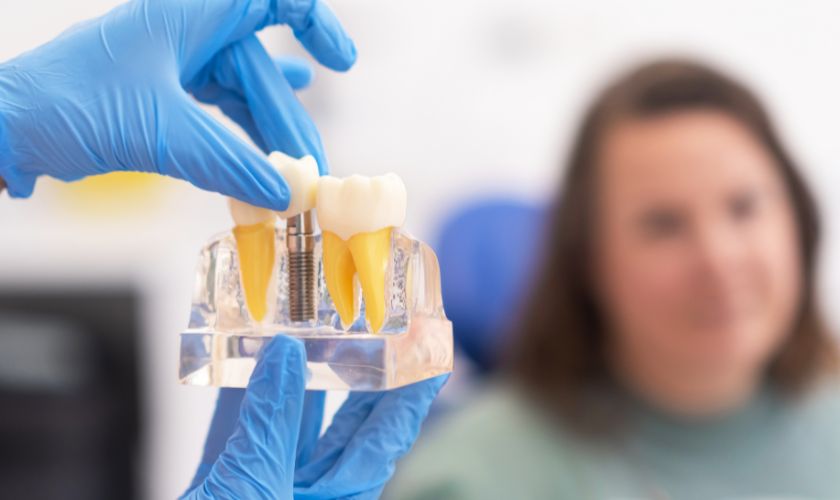Walk-Ins Welcome - Same-Day Dental Appointments Available

Jawbone density determines if implants function or not. Bone is the implant’s anchor and ensures stability. A fragile jawbone is unable to sustain dental implants and cause complications. Individuals do not care for bones until they start causing problems. Loss of teeth leads to bone atrophy and restricts the number of implants. Pre-hanging consciousness prevents extensive damage and improves success rates.
This blog explains jawbone health, implant stability, why bone loss occurs, signs of warning, and solutions. Understanding this link makes improved decisions accessible to anyone considering implants.
Why Jawbone Health Matters to Dental Implants
The jawbone provides the support that secures dental implants. If there is no healthy bone, implants loosen and fail. Bone density has a direct impact on implant stability and healing time. Thicker bone ensures implants bond well and are more durable. Poor bone typically reduces success rates and increases complications.
Patients with healthy jawbones have smoother recoveries. Dentists examine bone quality before the prescription of dental implants in Fort Worth. A healthy jawbone ensures long-term implant durability and function. Jawbone health still plays a paramount role in the predictability of implant outcomes.
Why Does Bone Loss Happen?
Lost teeth lead to bone resorption due to the loss of chewing stimulation. Periodontal disease kills bone via bacterial destruction. Jaw fractures or trauma from accidents or injury decrease bone quantity. Age-related changes naturally lower bone density over time. Smoking promotes bone loss by limiting blood flow.
Untreated problems can hinder successful dental implant placement. Malnutrition weakens bones and interferes with healing. Neglect of tooth loss can speed up further loss. Jawbone loss makes implants challenging and limits viable solutions. Early detection ensures easier preventive measures.
How Bone Quality Affects Implant Success
High-density bone supports better implant stability and healing. There exists a thin bone that fails to hold implants in place. Dental implants require osseointegration, where bone integrates into titanium.
Healthy bones will allow this important process to work effectively. Deteriorating bone delays integration and jeopardizes implant movement. People with denser bones recover more easily. Deteriorating bone often needs grafting procedures before dental implants in Fort Worth.
Bone quality also has a major impact on the survival of implants. Long-term function will be ensured by bone health. Every successful implant relies on successful bone integration.
Signs You May Have Bone Loss
Receding gums typically indicate bone loss. Loose teeth indicate insufficient bone support. Bite changes indicate structural bone problems. Facial collapse occurs due to extreme bone loss. Denture troubles signify bone reduction.
These are indicative of an undermined jawbone structure. Avoiding them decreases success rates for implants. Dentists assess bone quality via advanced imaging. Early signs identified enable quicker treatments. Stronger jawbones provide better conditions for successful implants.
Preventing Jawbone Loss Before and Following Implants
Replace missing teeth early to keep bone stimulation going. Keep regular oral hygiene to preserve supporting structures. Go for regular dental visits for professional examination. Eat food rich in calcium to preserve bone density. Avoid smoking to maintain good circulation of blood.
Go for dense diet choices for more robust bone healing. Exercise supports better bone health naturally. Preventive care results in greater dental implant success. Early treatment prevents expensive surgeries later. Healthy bones result in better long-term implant outcomes.
Jawbone condition establishes whether implants succeed or fail. Healthy bones provide solid implants. Left untreated, missing teeth lead to loss of bone and issues. Replacing them early preserves future alternatives. Every implant candidate should put bone tests on their agenda first.
Secure your oral foundation now. Schedule a consultation with us and find out if your jawbone is conducive to successful implants.




